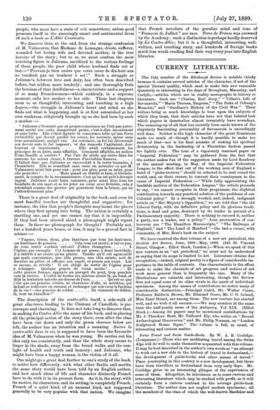CURRENT LITERATURE.
The July number of the Edinburgh Review is notable chiefly because it contains several articles of the character, if not of the
special literary quality, which used to make this now venerable Quarterly so interesting in the days of Brougham, Macaulay, and Carlyle,—articles which are in reality monographs in history or literature. Such are "Charles, Earl Grey," " Villari's Life of Savonarola," "Maria Theresa, Empress," "The Duke of Coburg's Memoirs," and "Gardiner's History of the Civil War." Their writers bring so much knowledge to bear upon the subjects of which they treat, that their articles have not that belated look which papers in Quarterlies almost invariably have nowadays.
The summing-up of all that has recently been made known of the singularly fascinating personality of Savonarola is exceedingly well done. Neither is the high character of the great Dominican made too much of—though it is hardly possible to make too
much of that—nor is his final mistake of sinking his spiritual dictatorship in the leadership of a Florentine faction passed too lightly over. The tone of a vigorously reasoned paper on "Imperial Federation" may be gathered from the fact that the author makes fun of the suggestion made by Lord Rosebery at the annual meeting, in May, of the Imperial Federation League, to the effect that out of the working men of England a band of " globe-trotters " should be selected to be sent round the world, and, on their return, to convert their countrymen to the cause of Imperial Federation :—" While fully appreciating the laudable motives of the Federation League," the article proceeds to say, "we cannot recognise in their programme the slightest contribution towards any practical solution of the problems of our Colonial policy." In a strongly worded, and, indeed, indignant article on "Her Majesty's Opposition," we are told that "the old Liberal Party, with its definitive policy and its glorious tradi- tions, is dead and gone, destroyed by its leader in pursuit of a Parliamentary majority. There is nothing to succeed it, neither a party, nor a leader, nor a policy." Less provocative of con- troversy are "The Hamilton Manuscripts," "The Railways of England," and "The Land of Manfred "—the last a résumé, with comments, of Mrs. Ross's book on the subject.


































 Previous page
Previous page